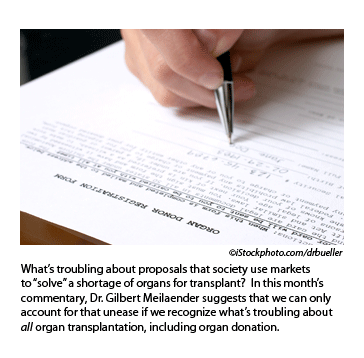By Gilbert Meilaender
Longer waiting lists for organ transplants have revived proposals that our society establish a market in organs — at least for sellers, if not also for buyers. It might work; that is, it might succeed in diminishing the number of those who
Why not then? Why not, in order to achieve a praiseworthy goal, change our current policy that permits giving but not selling of organs? Although many people instinctively sense that there is something problematic about such a proposal, we are ill-prepared to explain why. The reason is simple: We can only explain what is troubling about the sale of human organs if we first understand why all organ transplantation — even when the organ is given — is troubling. But we have bought so fervently into the notion that the “gift of life” through transplantation is desirable and praiseworthy that we have forgotten how deeply disturbing it ought to be.
In his short story “Whither Thou Goest,” Richard Selzer, surgeon and writer, explores the mysterious truth that a transplanted organ may bring with it the presence of the person from whom the organ was taken. When Hannah Owen writes to Mr. Pope seeking permission to listen for an hour to the heart of her deceased husband, which now beats in the body of Mr. Pope, she does so, as she puts it, because of “the predicament into which the ‘miracle of modern science’ has placed me.” She professes no interest at all in Mr. Pope himself other than as one who houses something she used to know well and longs to hear again. Such is the mystery of the body and its parts, however, that a reader may wonder about this when, after finally receiving permission to listen to the heart now beating in Mr. Pope, Hannah is “nervous as a bride.” For her, at any rate, the heart beating in Mr. Pope’s chest continues to carry the presence of her husband.
This is fiction, of course, but it may be profound human wisdom as well. The organ, the body, and the person for whom that body is the place of presence are not so easily separated in our psyches. Nor should they be. Despite the creation story teaching that we are made from dust of the ground, despite our regular affirmation that the Son of the Father was made flesh and born from Mary’s womb, despite our hope that as Jesus was raised bodily so shall we be, despite all these central Christian teachings, we too often assume that the real person is simply spirit rather than one present to us only in the body.
We can train ourselves — and to some degree we have trained ourselves — to think of the body as a thing we own and use. Likewise, surgeons have trained themselves to do what no physician would ordinarily do: operate on a healthy person in order to help someone other than that person himself. We have done this because of the good that may be achieved through organ transplantation. To that end we reduce the embodied person to a collection of parts, thinking of the person simply as the sum total of those parts. But we do not know, interact with, or love others understood in that way. On the contrary, we know them as a unity of body, mind, will, and spirit that is more — far more — than just the sum of their parts.
Transplantation upsets received Christian understandings of the meaning of the body in ways that are troubling. It is precisely to make our peace with these problems — to take them seriously and avoid losing our way in seeking to do good — that we have turned in the direction of donation. To think of the transplanted organ as a gift means that its connection to the donor’s body remains and is recognized. Whatever psychological complications this may entail, it at least protects us against supposing that our bodies are simply collections of parts that can be “alienated” from ourselves in the way a thing or a commodity can be.
One who agrees to donate an organ gives himself or herself — not a thing that is owned, but one’s very person. A gift — even a gift of something other than one’s body — carries with it the person’s presence in a way that sale and purchase do not. The donation model, therefore, is not built on the premise that a person is separate from his body and owns it. Once we think in terms of ownership, it will be a short step to pretending (the psychology of it will be trickier) that the “donated” organ, being utterly alienable, retains no connection at all to the person who has given it. Our society has wisely not turned in that direction, and Christians in particular should not train themselves to think of the body in that way. It is the concept of donation that has allowed us to recognize what is troubling about all transplantation while still finding a way to permit some.
Unless we appreciate the deep-seated and legitimate reasons for hesitation about organ transplantation, we will focus only on the good of relieving suffering and not also on the good of preserving the integrity of the body as the place of personal presence. We will be tempted to think of ourselves as spiritual overlords, free to use the body and its parts as we see fit in the service of good causes. Even a practice of donation can be abused, of course. But permitting organ procurement only through donation allows us, even if just barely, to retain a sense of connection between the part and the whole, the person and the body — allows us, that is, not to destroy our humanity in seeking to do good.
Dr. Gilbert Meilaender, an LCMS clergyman, holds the Duesenberg Chair in Christian Ethics at Valparaiso University, Valparaiso, Ind.
Posted Oct. 24, 2008

